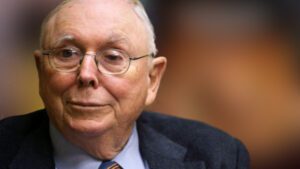Charlie Munger: The Right Hand of the Oracle?
Contents
- 1 Charlie Munger: The Right Hand of the Oracle?
- 2 But who exactly is Charlie Munger?
- 3 A Tapestry of Diverse Disciplines: The Munger Philosophy
- 4 The Inversion Power: Thinking Forward by Thinking Backward
- 5 Munger’s Time-Tested Principles: Rationale and Patience
- 6 Berkshire Hathaway and the Munger Effect
When it comes to investment and financial sage advice, Warren Buffett’s name is practically associated with success. But every successful investor has, at their core, a valued confidant whose thoughts are just as significant. Buffett believes that individual to be Charlie Munger, a man whose wit and intelligence have had a lasting impression on the financial industry.

But who exactly is Charlie Munger?
At the investment firm and global conglomerate Berkshire Hathaway, which is headed by Warren Buffett, Charlie Munger serves as vice chairman. Munger, who was born on January 1st, 1924, has been a crucial contributor to Berkshire Hathaway’s success in addition to being Buffett’s longstanding business partner. Frequently called the “Oracle Munger, “Omaha’s right-hand man,” is a complex person who combines his responsibilities as an investor, philanthropist, and wise man.
A Tapestry of Diverse Disciplines: The Munger Philosophy
Charlie Munger’s multidisciplinary approach to investing is one of its defining characteristics. Munger’s philosophy is a multidisciplinary tapestry that incorporates concepts from economics, biology, psychology, and other fields. Munger, who recognizes that real-world issues are frequently intricate and interwoven, adheres to a more holistic view of the world than certain investors who only consider financial data.
Munger is well-known for supporting the value of mental models, which are broad conceptions drawn from several fields of study that aid in decision-making. Munger contends that by broadening their mental toolset, investors can approach problems from a different angle and become more adept at navigating the intricate world of financial markets.
The Inversion Power: Thinking Forward by Thinking Backward
The idea of inversion is among Munger’s most well-known mental models. Munger advises thinking about ways to prevent failure rather than just how to succeed. Through retrospective analysis and risk assessment, investors can establish a more resilient decision-making framework. Munger thinks that this strategy aids in risk identification and mitigation, which is an essential component of profitable long-term investing.
Munger uses inversion as a tool for problem-solving in many facets of life, not only risk management. People are better able to create tactics that work and make wise judgments when they know what could go wrong.
Munger’s Time-Tested Principles: Rationale and Patience
Munger is an advocate of patience and reason in a world where quick thinking and rapid gratification are the norm. He frequently stresses the value of holding off on making snap decisions and waiting for the ideal opportunities. Munger’s long-term investment holdings and emphasis on companies with sustainable competitive advantages define his investment strategy.
Munger also values reason a lot and advises investors to think for themselves rather than follow the herd. His enduring quote, “It is remarkable how much long-term advantage people like us have gotten by trying to be consistently not stupid, instead of trying to be very bright,”perfectly captures his conviction that staying out of frequent mistakes can be more beneficial than trying to be exceptionally intelligent. rather than chasing exceptional genius.
Berkshire Hathaway and the Munger Effect
It is impossible to exaggerate Charlie Munger’s influence on Berkshire Hathaway. His collaboration with Warren Buffett has made the corporation one of the most renowned and prosperous businesses in the world. Beyond financial choices, Munger has had a significant impact in forming Berkshire Hathaway’s company culture, which prioritizes honesty, openness, and a long-term outlook.
conclusion
Charlie Munger’s knowledge extends beyond the field of finance and provides perspectives that are useful in a variety of contexts. Munger’s concepts, which range from the value of patience and reason to the effectiveness of mental models, offer a timeless framework for anyone trying to succeed in a complicated and dynamic environment. Individuals and investors alike might find motivation in the The man at Oracle’s right hand, opening the door to a more deliberate and planned approach to decision-making.
